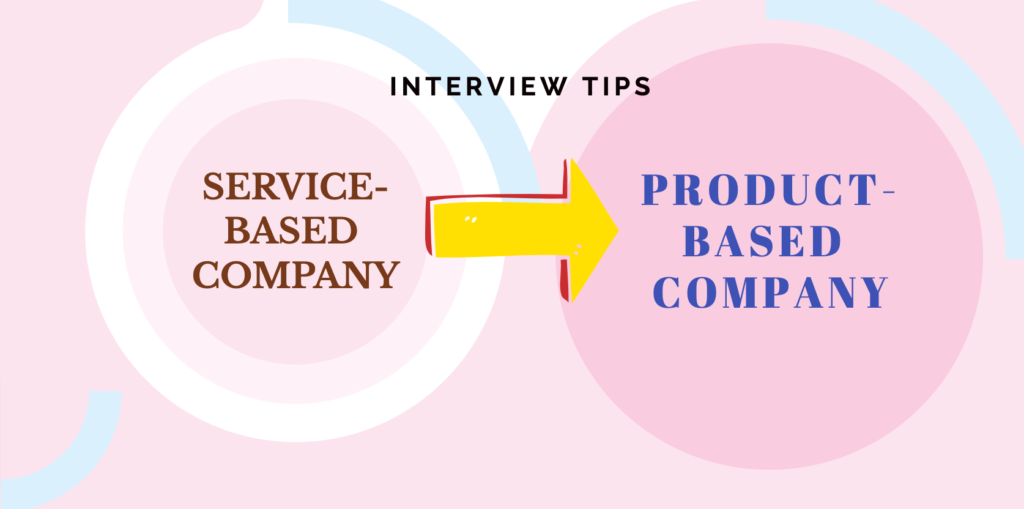Interview Tips: Switching From Service-based to Product-based Company

Most of the graduates beginp their careers with a service-based company and get more exposure to product-based companies only later, through their network.
However, the initial years at your job often shapes your career. While a service-based company will give a good kickstart to your career through exposure to various projects, it is also important to know the prospects that a product company holds, particularly from the perspective of potential employers.
So let’s explore what exactly is a product-based company and what makes it more likeable than a service-based company for some hiring managers?
Difference between Service and Product-based Company
Product-based companies are those that build and own products and are responsible for marketing and sales of the product in their designated market. For example, Amazon, Facebook, Homage, NTUC Enterprise and Google.
Service-based companies, on the other hand, provide services either B2B or D2C. Often, the product-based companies are their clients. Examples include Accenture, PwC, EPAM, etc.
Let’s see what are the differences between expectations in product and service-based companies:
| Product-based Company Job | Service-based Company Job |
| Hire selectively and have fewer candidates for various roles. | Commonly known for their mass recruitment drives particularly through college placements. |
| In the interview, the focus is on domain knowledge and technical skills. | Interviewers look for a diverse skill-set including communication skills, and decision-making skills in addition to domain and technical knowledge. |
| Challenging environment, great learning curve, encourage innovation and work on latest technologies. | Exposure to a wide range of projects and ample opportunities for client interactions. |
| Work is mostly at a designated workplace | Typically, work could be onsite or offsite based on the clients they are supporting |
Preparing For A Switch Into a Product-based Company
While a switch from a service-based company to a product-based company is not going to be easy, good interview preparation with the right approach will make the transition easier. We have chunked down the preparation into three parts:
1. The Interview Process
Every product company may have a slightly different interview process but it is largely divided into the below steps:
2. Resume shortlisting
Companies usually conduct the initial screening of candidates according to their resumes. Thus, to ensure that you get interview calls, keep your resume updated with education and coursework, relevant skills, significant achievements, work experience, and projects. If you are applying for a software role, including a GitHub profile will also be a great way to showcase your capabilities.
3. Exploratory Call
If your resume gets shortlisted, you will be invited for a 20–30-minute call with the recruiter. In this call, the recruiter will try to cross-check the skills you have mentioned in your resume and will explain to you the roles and responsibilities involved. You are likely to be assessed for computer fundamentals such as OOP, data structure and algorithm, problem-solving attitude and aptitude skills.
4. Coding rounds
This round checks general aptitude, knowledge on technical subjects, basic level coding and design skills. These are time-bound rounds and your speed can be a deciding factor. It can be an online coding round, take-home assignment or an on-the-spot coding test. A large number of candidates are rejected at this stage. While interviewing experienced professionals, the round might be skipped altogether.
5. Technical Round
The technical round focuses on technical knowledge in detail. Topics may include data structures and algorithms, object-oriented programming, DBMS, Operating system concepts, computer networks, etc. The interviewer might also ask questions related to the candidate’s previous experience, and side projects. Apart from core technical skills, you will also be tested for your problem-solving approach, design and debugging skills.
6. Design Round
This round is designed for experienced or design professionals. The interviewer would ask questions about system design, design patterns and principles, system architecture and its components.
7. HR or Behavioural round
If you reach this round, that is probably because the hiring company is convinced of your coding skills. It is now time for them to understand your values, faith and beliefs. Do your homework about the company and the role you’ve applied for. You may have to face any commonly asked behavioural questions such as your strength and weakness, challenges at work, biggest success or failure, leadership skills, etc.
How to Prepare For a Technical Interview
1. Data Structure and Algorithms (DSA)
Strengthen your DSA. Some of the basic DSA topics are Stack, Arrays, HashMap, Queue, Heap, Linked List, Graph, Tree, binary search, and bubble sort. Practice a lot and become proficient. Doing some open-source projects will also help you enhance your skills.
2. Theoretical concepts to focus on
For your interview, you should be comfortable with the core computer skills. Revise the fundamentals about OOPs concept, DBMS, operating system, system architecture, computer network, etc.
3. Machine coding and SQL
Top product companies have an additional machine coding round. Here, you are given a problem statement and are expected to design and code the solution within a stipulated time. The idea is that solution code should be clean, modular and extensible and should fulfil all the requirements stated in the problem. An example of a machine coding problem could be to design a snake and ladder game with certain requirements and constraints. The interviewer will then review your code and analyse your design decisions. So, get yourself comfortable with system architecture, design and SQL. Also, regularly practice coding skills through platforms like HackerTrail, Leetcode, etc.
How to Get That Interview Call
The toughest part of getting a job in a product company is to receive interview calls. Here are some suggestions to ensure you get one:
- Network with people working at product companies. Reach out to your friends, alumni network, and ask them for referrals.
- Search for people on LinkedIn. If you don’t know many people working in top companies, common connections on LinkedIn might help you reach out to some.
- Make an exemplary resume. If you are working on a support project in your company, find ways to move to a development project and add it to your resume.
- Take up a side project or contribute to an open-source.
- Be in good company. Make friends with people who also wish to move to a product-based company. This way you can help each other and consistently prepare for the interview.
So, You Finally Managed to Get an Interview Invite From a Product Company.
Now you need to make sure that you crack this interview. Therefore, you must go through these additional tips that you can follow during your interview.
Though both service-based and product-based offer their own pros and cons, working in a product-based company will help you to gain a significant level of expertise in your specialisation because of the opportunity to keep iterating a product to a greater stage, which is often not the case for a service-based company.
Stay confident, positive and keep working hard until you get
Backend Technology Interview Questions
C Programming Language Interview Questions | PHP Interview Questions | .NET Core Interview Questions | NumPy Interview Questions | API Interview Questions | FastAPI Python Web Framework | Java Exception Handling Interview Questions | OOPs Interview Questions and Answers | Java Collections Interview Questions | System Design Interview Questions | Data Structure Concepts | Node.js Interview Questions | Django Interview Questions | React Interview Questions | Microservices Interview Questions | Key Backend Development Skills | Data Science Interview Questions | Python Interview Questions | Java Spring Framework Interview Questions | Spring Boot Interview Questions.
Frontend Technology Interview Questions
HTML Interview Questions | Angular Interview Questions | JavaScript Interview Questions | CSS Interview Questions.
Database Interview Questions
SQL Interview Questions | PostgreSQL Interview Questions | MongoDB Interview Questions | MySQL Interview Questions | DBMS Interview Questions.
Cloud Interview Questions
AWS Lambda Interview Questions | Azure Interview Questions | Cloud Computing Interview Questions | AWS Interview Questions.
Quality Assurance Interview Questions
Moving from Manual Testing to Automated Testing | Selenium Interview Questions | Automation Testing Interview Questions.
DevOps and Cyber Security Interview Questions
DevOps Interview Questions | How to Prevent Cyber Security Attacks | Guide to Ethical Hacking | Network Security Interview Questions.
Design Product Interview Questions
Product Manager Interview Questions | UX Designer Interview Questions.
Interview Preparation Tips
Strength and Weakness Interview Questions | I Accepted a Job Offer But Got Another Interview | Preparation Tips For the Virtual Technical Interview | 7 Tips to Improve Your GitHub Profile to Land a Job | Software Engineer Career Opportunities in Singapore | What can you expect during a whiteboard interview | How To Write A Resignation Letter | Recommendation Letter Templates and Tips.
Quick Links
Practice Skills | Best Tech Recruitment Agency in Singapore, India | Graduate Hiring | HackerTrail Litmus | Scout - Sourcing Top Tech Talent in ONE Minute | About HackerTrail | Careers | Job Openings.





